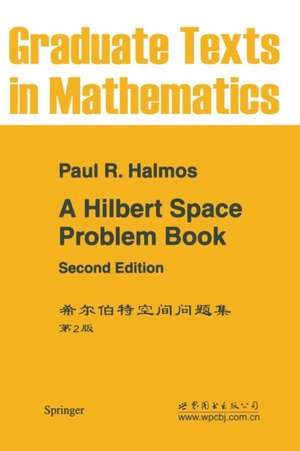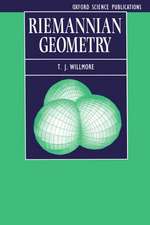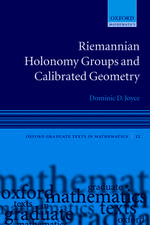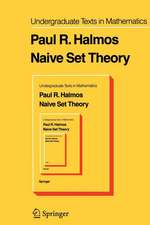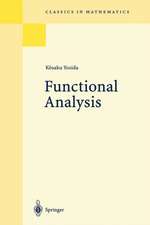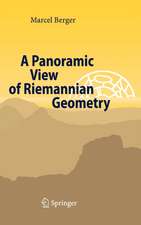A Hilbert Space Problem Book: Graduate Texts in Mathematics, cartea 19
Autor P.R. Halmosen Limba Engleză Paperback – 3 mai 2012
This is not an introduction to Hilbert space theory. Some knowledge of that subject is a prerequisite: at the very least, a study of the elements of Hilbert space theory should proceed concurrently with the reading of this book."
| Toate formatele și edițiile | Preț | Express |
|---|---|---|
| Paperback (1) | 403.47 lei 38-44 zile | |
| Springer – 3 mai 2012 | 403.47 lei 38-44 zile | |
| Hardback (1) | 595.21 lei 43-57 zile | |
| Springer – 8 noi 1982 | 595.21 lei 43-57 zile |
Din seria Graduate Texts in Mathematics
-
 Preț: 402.87 lei
Preț: 402.87 lei -
 Preț: 383.85 lei
Preț: 383.85 lei - 17%
 Preț: 366.90 lei
Preț: 366.90 lei - 17%
 Preț: 528.66 lei
Preț: 528.66 lei -
 Preț: 337.45 lei
Preț: 337.45 lei - 17%
 Preț: 398.97 lei
Preț: 398.97 lei -
 Preț: 355.82 lei
Preț: 355.82 lei -
 Preț: 412.24 lei
Preț: 412.24 lei -
 Preț: 404.47 lei
Preț: 404.47 lei -
 Preț: 289.88 lei
Preț: 289.88 lei - 17%
 Preț: 365.79 lei
Preț: 365.79 lei - 17%
 Preț: 359.45 lei
Preț: 359.45 lei - 15%
 Preț: 488.70 lei
Preț: 488.70 lei - 13%
 Preț: 357.75 lei
Preț: 357.75 lei -
 Preț: 407.88 lei
Preț: 407.88 lei - 13%
 Preț: 352.49 lei
Preț: 352.49 lei - 13%
 Preț: 358.86 lei
Preț: 358.86 lei - 13%
 Preț: 393.48 lei
Preț: 393.48 lei - 11%
 Preț: 351.00 lei
Preț: 351.00 lei - 17%
 Preț: 359.58 lei
Preț: 359.58 lei -
 Preț: 350.45 lei
Preț: 350.45 lei - 8%
 Preț: 567.36 lei
Preț: 567.36 lei -
 Preț: 399.74 lei
Preț: 399.74 lei -
 Preț: 498.91 lei
Preț: 498.91 lei - 20%
 Preț: 571.26 lei
Preț: 571.26 lei - 15%
 Preț: 546.59 lei
Preț: 546.59 lei -
 Preț: 498.69 lei
Preț: 498.69 lei - 15%
 Preț: 354.39 lei
Preț: 354.39 lei -
 Preț: 313.10 lei
Preț: 313.10 lei - 13%
 Preț: 427.39 lei
Preț: 427.39 lei - 17%
 Preț: 363.59 lei
Preț: 363.59 lei -
 Preț: 340.18 lei
Preț: 340.18 lei - 17%
 Preț: 364.47 lei
Preț: 364.47 lei - 17%
 Preț: 366.47 lei
Preț: 366.47 lei - 17%
 Preț: 366.06 lei
Preț: 366.06 lei -
 Preț: 247.59 lei
Preț: 247.59 lei - 17%
 Preț: 367.70 lei
Preț: 367.70 lei - 13%
 Preț: 356.79 lei
Preț: 356.79 lei - 17%
 Preț: 398.78 lei
Preț: 398.78 lei - 17%
 Preț: 398.51 lei
Preț: 398.51 lei - 17%
 Preț: 496.63 lei
Preț: 496.63 lei - 15%
 Preț: 482.97 lei
Preț: 482.97 lei -
 Preț: 401.99 lei
Preț: 401.99 lei - 17%
 Preț: 366.56 lei
Preț: 366.56 lei - 20%
 Preț: 449.73 lei
Preț: 449.73 lei -
 Preț: 380.34 lei
Preț: 380.34 lei
Preț: 403.47 lei
Preț vechi: 498.12 lei
-19% Nou
Puncte Express: 605
Preț estimativ în valută:
77.20€ • 80.82$ • 63.88£
77.20€ • 80.82$ • 63.88£
Carte tipărită la comandă
Livrare economică 02-08 aprilie
Preluare comenzi: 021 569.72.76
Specificații
ISBN-13: 9781468493320
ISBN-10: 1468493329
Pagini: 396
Dimensiuni: 152 x 229 x 25 mm
Greutate: 0.53 kg
Ediția:2nd ed. 1982
Editura: Springer
Colecția Springer
Seria Graduate Texts in Mathematics
Locul publicării:New York, NY, United States
ISBN-10: 1468493329
Pagini: 396
Dimensiuni: 152 x 229 x 25 mm
Greutate: 0.53 kg
Ediția:2nd ed. 1982
Editura: Springer
Colecția Springer
Seria Graduate Texts in Mathematics
Locul publicării:New York, NY, United States
Public țintă
GraduateDescriere
From
the
Preface:
"This
book
was
written
for
the
active
reader.
The
first
part
consists
of
problems,
frequently
preceded
by
definitions
and
motivation,
and
sometimes
followed
by
corollaries
and
historical
remarks...
The
second
part,
a
very
short
one,
consists
of
hints...
The
third
part,
the
longest,
consists
of
solutions:
proofs,
answers,
or
contructions,
depending
on
the
nature
of
the
problem....
This is not an introduction to Hilbert space theory. Some knowledge of that subject is a prerequisite: at the very least, a study of the elements of Hilbert space theory should proceed concurrently with the reading of this book."
This is not an introduction to Hilbert space theory. Some knowledge of that subject is a prerequisite: at the very least, a study of the elements of Hilbert space theory should proceed concurrently with the reading of this book."
Cuprins
1.
Vectors.-
1.
Limits
of
quadratic
forms.-
2.
Schwarz
inequality.-
3.
Representation
of
linear
functional.-
4.
Strict
convexity.-
5.
Continuous
curves.-
6.
Uniqueness
of
crinkled
arcs.-
7.
Linear
dimension.-
8.
Total
sets.-
9.
Infinitely
total
sets.-
10.
Infinite
Vandermondes.-
11.
T-totalsets.-
12.
Approximate
bases.-
2.
Spaces.-
13.
Vector
sums.-
14.
Lattice
of
subspaces.-
15.
Vector
sums
and
the
modular
law.-
16.
Local
compactness
and
dimension.-
17.
Separability
and
dimension.-
18.
Measure
in
Hilbert
space.-
3.
Weak
Topology.-
19.
Weak
closure
of
subspaces.-
20.
Weak
continuity
of
norm
and
inner
product.-
21.
Semicontinuity
of
norm.-
22.
Weak
separability.-
23.
Weak
compactness
of
the
unit
ball.-
24.
Weak
metrizability
of
the
unit
ball.-
25.
Weak
closure
of
the
unit
sphere.-
26.
Weak
metrizability
and
separability.-
27.
Uniform
boundedness.-
28.
Weak
metrizability
of
Hilbert
space.-
29.
Linear
functionals
on
l2.-
30.
Weak
completeness.-
4.
Analytic
Functions.-
31.
Analytic
Hilbert
spaces.-
32.
Basis
for
A2.-
33.
Real
functions
in
H2.-
34.
Products
in
H2.-
35.
Analytic
characterization
of
H2.-
36.
Functional
Hilbert
spaces.-
37.
Kernel
functions.-
38.
Conjugation
in
functional
Hilbert
spaces.-
39.
Continuity
of
extension.-
40.
Radial
limits.-
41.
Bounded
approximation.-
42.
Multiplicativity
of
extension.-
43.
Dirichlet
problem.-
5.
Infinite
Matrices.-
44.
Column-finite
matrices.-
45.
Schur
test.-
46.
Hilbert
matrix.-
47.
Exponential
Hilbert
matrix.-
48.
Positivity
of
the
Hilbert
matrix.-
49.
Series
of
vectors.-
6.
Boundedness
and
Invertibility.-
50.
Boundedness
on
bases.-
51.
Uniform
boundedness
of
linear
transformations.-
52.
Invertible
transformations.-
53.
Diminishablc
complements.-
54.
Dimension
in
inner-product
spaces.-
55.
Total
orthonormal
sets.-
56.
Preservation
of
dimension.-
57.
Projections
of
equal
rank.-
58.
Closed
graph
theorem.-
59.
Range
inclusion
and
factorization.-
60.
Unbounded
symmetric
transformations.-
7.
Multiplication
Operators.-
61.
Diagonal
operators.-
62.
Multiplications
on
l2.-
63.
Spectrum
of
a
diagonal
operator.-
64.
Norm
of
a
multiplication.-
65.
Boundedness
of
multipliers.-
66.
Boundedness
of
multiplications.-
67.
Spectrum
of
a
multiplication.-
68.
Multiplications
on
functional
Hilbert
spaces.-
69.
Multipliers
of
functional
Hilbert
spaces.-
8.
Operator
Matrices.-
70.
Commutative
operator
determinants.-
71.
Operator
determinants.-
72.
Operator
determinants
with
a
finite
entry.-
9.
Properties
of
Spectra.-
73.
Spectra
and
conjugation.-
74.
Spectral
mapping
theorem.-
75.
Similarity
and
spectrum.-
76.
Spectrum
of
a
product.-
77.
Closure
of
approximate
point
spectrum.-
78.
Boundary
of
spectrum.-
10.
Examples
of
Spectra.-
79.
Residual
spectrum
of
a
normal
operator.-
80.
Spectral
parts
of
a
diagonal
operator.-
81.
Spectral
parts
of
a
multiplication.-
82.
Unilateral
shift.-
83.
Structure
of
the
set
of
eigenvectors.-
84.
Bilateral
shift.-
85.
Spectrum
of
a
functional
multiplication.-
11.
Spectral
Radius.-
86.
Analyticity
of
resolvents.-
87.
Non-emptiness
of
spectra.-
88.
Spectral
radius.-
89.
Weighted
shifts.-
90.
Similarity
of
weighted
shifts.-
91.
Norm
and
spectral
radius
of
a
weighted
shift.-
92.
Power
norms.-
93.
Eigenvalues
of
weighted
shifts.-
94.
Approximate
point
spectrum
of
a
weighted
shift.-
95.
Weighted
sequence
spaces.-
96.
One-point
spectrum.-
97.
Analytic
quasinilpotents.-
98.
Spectrum
of
a
direct
sum.-
12.
Norm
Topology.-
99.
Metric
space
of
operators.-
100.
Continuity
of
inversion.-
101.
Interior
of
conjugate
class.-
102.
Continuity
of
spectrum.-
103.
Semicontinuity
of
spectrum.-
104.
Continuity
of
spectral
radius.-
105.
Normal
continuity
of
spectrum.-
106.
Quasinilpotent
perturbations
of
spectra.-
13.
Operator
Topologies.-
107.
Topologies
for
operators.-
108.
Continuity
of
norm.-
109.
Semicontinuity
of
operator
norm.-
110.
Continuity
of
adjoint.-
111.
Continuity
of
multiplication.-
112.
Separate
continuity
of
multiplication.-
113.
Sequential
continuity
of
multiplication.-
114.
Weak
sequential
continuity
of
squaring.-
115.
Weak
convergence
of
projections.-
14.
Strong
Operator
Topology.-
116.
Strong
normal
continuity
of
adjoint.-
117.
Strong
bounded
continuity
of
multiplication.-
118.
Strong
operator
versus
weak
vector
convergence.-
119.
Strong
semicontinuity
of
spectrum.-
120.
Increasing
sequences
of
Hermitian
operators.-
121.
Square
roots.-
122.
Infimum
of
two
projections.-
15.
Partial
Isometries.-
123.
Spectral
mapping
theorem
for
normal
operators.-
124.
Decreasing
squares.-
125.
Polynomially
diagonal
operators.-
126.
Continuity
of
the
functional
calculus.-
127.
Partial
isometries.-
128.
Maximal
partial
isometries.-
129.
Closure
and
connectedness
of
partial
isometries.-
130.
Rank,
co-rank,
and
nullity.-
131.
Components
of
the
space
of
partial
isometries.-
132.
Unitary
equivalence
for
partial
isometries.-
133.
Spectrum
of
a
partial
isometry.-
16.
Polar
Decomposition.-
134.
Polar
decomposition.-
135.
Maximal
polar
representation.-
136.
Extreme
points.-
137.
Quasinormal
operators.-
138.
Mixed
Schwarz
inequality.-
139.
Quasinormal
weighted
shifts.-
140.
Density
of
invertible
operators.-
141.
Connectedness
of
invertible
operators.-
17.
Unilateral
Shift.-
142.
Reducing
subspaces
of
normal
operators.-
143.
Products
of
symmetries.-
144.
Unilateral
shift
versus
normal
operators.-
145.
Square
root
of
shift.-
146.
Commutant
of
the
bilateral
shift.-
147.
Commutant
of
the
unilateral
shift.-
148.
Commutant
of
the
unilateral
shift
as
limit.-
149.
Characterization
of
isometries.-
150.
Distance
from
shift
to
unitary
operators.-
151.
Square
roots
of
shifts.-
152.
Shifts
as
universal
operators.-
153.
Similarity
to
parts
of
shifts.-
154.
Similarity
to
contractions.-
155.
Wandering
subspaces.-
156.
Special
invariant
subspaces
of
the
shift.-
157.
Invariant
subspaces
of
the
shift.-
158.
F.
and
M.
Riesz
theorem.-
159.
Reducible
weighted
shifts.-
18.
Cyclic
Vectors.-
160.
Cyclic
vectors.-
161.
Density
of
cyclic
operators.-
162.
Density
of
non-cyclic
operators.-
163.
Cyclicity
of
a
direct
sum.-
164.
Cyclic
vectors
of
adjoints.-
165.
Cyclic
vectors
of
a
position
operator.-
166.
Totality
of
cyclic
vectors.-
167.
Cyclic
operators
and
matrices.-
168.
Dense
orbits.-
19.
Properties
of
Compactness.-
169.
Mixed
continuity.-
170.
Compact
operators.-
171.
Diagonal
compact
operators.-
172.
Normal
compact
operators.-
173.
Hilbert-Schmidt
operators.-
174.
Compact
versus
Hilbert-Schmidt.-
175.
Limits
of
operators
of
finite
rank.-
176.
Ideals
of
operators.-
177.
Compactness
on
bases.-
178.
Square
root
of
a
compact
operator.-
179.
Fredholm
alternative.-
180.
Range
of
a
compact
operator.-
181.
Atkinson’s
theorem.-
182.
Weyl’s
theorem.-
183.
Perturbed
spectrum.-
184.
Shift
modulo
compact
operators.-
185.
Distance
from
shift
to
compact
operators.-
20.
Examples
of
Compactness.-
186.
Bounded
Volterra
kernels.-
187.
Unbounded
Volterra
kernels.-
188.
Volterra
integration
operator.-
189.
Skew-symmetric
Volterra
operator.-
190.
Norm
1,
spectrum
{1}.-
191.
Donoghue
lattice.-
21.
Subnormal
Operators.-
192.
Putnam-Fuglede
theorem.-
193.
Algebras
of
normal
operators.-
194.
Spectral
measure
of
the
unit
disc.-
195.
Subnormal
operators.-
196.
Quasinormal
invariants.-
197.
Minimal
normal
extensions.-
198.
Polynomials
in
the
shift.-
199.
Similarity
of
subnormal
operators.-
200.
Spectral
inclusion
theorem.-
201.
Filling
in
holes.-
202.
Extensions
of
finite
co-dimension.-
203.
Hyponormal
operators.-
204.
Normal
and
subnormal
partial
isometries.-
205.
Norm
powers
and
power
norms.-
206.
Compact
hyponormal
operators.-
207.
Hyponormal,
compact
imaginary
part.-
208.
Hyponormal
idempotents.-
209.
Powers
of
hyponormal
operators.-
22.
Numerical
Range.-
210.
Toeplitz-Hausdorff
theorem.-
211.
Higher-dimensional
numerical
range.-
212.
Closure
of
numerical
range.-
213.
Numerical
range
of
a
compact
operator.-
214.
Spectrum
and
numerical
range.-
215.
Quasinilpotence
and
numerical
range.-
216.
Normality
and
numerical
range.-
217.
Subnormality
and
numerical
range.-
218.
Numerical
radius.-
219.
Normaloid,
convexoid,
and
spectraloid
operators.-
220.
Continuity
of
numerical
range.-
221.
Power
inequality.-
23.
Unitary
Dilations.-
222.
Unitary
dilations.-
223.
Images
of
subspaces.-
224.
Weak
closures
and
dilations.-
225.
Strong
closures
and
extensions.-
226.
Strong
limits
of
hyponormal
operators.-
227.
Unitary
power
dilations.-
228.
Ergodic
theorem.-
229.
von
Neumann’s
inequality.-
24.
Commutators.-
230.
Commutators.-
231.
Limits
of
commutators.-
232.
Kleinecke-Shirokov
theorem.-
233.
Distance
from
a
commutator
to
the
identity.-
234.
Operators
with
large
kernels.-
235.
Direct
sums
as
commutators.-
236.
Positive
self-commutators.-
237.
Projections
as
self-commutators.-
238.
Multiplicative
commutators.-
239.
Unitary
multiplicative
commutators.-
240.
Commutator
subgroup.-
25.
Toeplitz
Operators.-
241.
Laurent
operators
and
matrices.-
242.
Toeplitz
operators
and
matrices.-
243.
Toeplitz
products.-
244.
Compact
Toeplitz
products.-
245.
Spectral
inclusion
theorem
for
Toeplitz
operators.-
246.
Continuous
Toeplitz
products.-
247.
Analytic
Toeplitz
operators.-
248.
Eigenvalues
of
Hermitian
Toeplitz
operators.-
249.
Zero-divisors.-
250.
Spectrum
of
a
Hermitian
Toeplitz
operator.-
References.-
List
of
Symbols.
